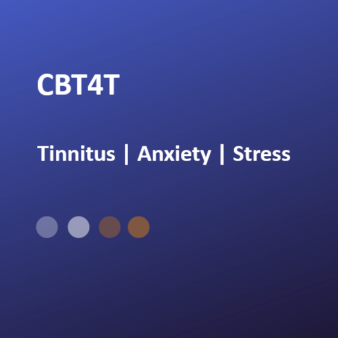Useful to know before deciding to enrol on CBT4T
The CBT4T programme was developed in 2020 to open up access to what had previously only been available through individual CBT for people with severe tinnitus distress. Such specialist individual CBT provision is expensive, causing the cost to be prohibitive for the majority who could otherwise benefit.
Prior to 2020, the 6 module Tinnitus E-Programme that implemented a cognitive approach to tinnitus had been available as an online programme since 2009. Outcomes were excellent BUT – as a short online programme, it was only ever suitable for people with up to moderate tinnitus distress (TFI category 3: 32-53% max), mild anxiety (GAD-7: 5-9 max) and moderate stress (PSS: 14-26 max).
To be suitable for people with severe tinnitus distress (TFI categories 4 & 5) for whom levels of anxiety and/or stress are also significantly elevated (sometimes pre-tinnitus, sometimes post-tinnitus), a very different approach and pace - aligned with those used in individual provision - was needed.
Five years on: CBT4T has run long enough now for me to reflect not only on the individual successes of those benefiting from the course (see outcomes & feedback in their reviews), but to highlight what all these people have in common. After all, there is a wide range of difference across backgrounds, knowledge, and experience.
From CBT4T 2025:
“CBT4T is used by a wide range of people. They are singles, parents, grandparents, all ages from early 20s to in their 80s (most are 35-50). They are employed, self-employed, retired, between jobs, students in FE, graduate, post-graduate, doctoral… They are trainers, coaches, shop workers, journalists, musicians, drivers, admin, secretaries, factory workers, teachers, lecturers, professors, doctors, consultants, GPs, nurses, physiotherapists, counsellors, psychologists… They work in sales, marketing, finance, accounts, insurance, banking, commerce at all levels… They are military and ex-military veterans… They are emergency services workers - police, fire and ambulance… I won’t have thought of every role past users of the course have had I know, and to date, there has just been the one airline pilot!”
What traits do people using CBT4T have in common?
I see three common traits.
Each person is sufficiently open-minded, willing and serious to:
- Learn about and understand that our individual psychology (who we understand ourselves to be, think and feel) results from past experiences that mapped our current mindset
- Bring about change (develop & improve psychological flexibility) through re-mapping a mindset that is having difficulty meeting the demands of everyday living including the demands of troublesome intrusiveness tinnitus
- Utilise the structured process and built-in support of the CBT4T programme to replace old routine reactions that are ‘unfit for purpose’ (maladaptive plasticity) with new routine actions that become routine reactions through practice and ‘fit for purpose’ (adaptive plasticity = successful re-mapping) - see information about neuroplasticity
WISDOM is not about being intellectual or academic
A common concern I see mentioned by some, particularly as they start out on the programme, is along the lines of “It’s been so long since I did any study, I worry I won’t be up to the course”. Applying yourself to the CBT4T programme does not need you to be academic or have an academic background. On the contrary, the programme is practical. One reason for naming CBT4T a programme rather than a course is an attempt to move away from the idea of theoretical learning towards practical application.
I also see individuals' comments in logs, cognition tools, core belief work and SITREPs that undermine belief in themselves and their capabilities. This undermining of self is to be seen across the board, from highly academic individuals to those without a formal qualification to their name. The undermining of self is more a learned behaviour, frequently though not exclusively embedded during early-years. CBT4T provides Core Belief work (Stage 7) to unpick and dismantle it!
Wisdom is about life experience and insight in to human nature, so you’ll be bringing your wisdom with you when you enrol, you’ll be using it as you progress, improve your ability to balance your "THREE MINDS" and as you progress you’ll even enhance it!
To explore this a little further….
What are the differences between intellect, intelligence and wisdom?
After a quick internet search, I found this: (Ref: Bing search intellect vs intelligence vs wisdom, date of search 3rd September 2025)
“Intellect, intelligence, and wisdom are distinct yet interconnected concepts that reflect different aspects of human cognition and understanding.
Definitions:
Intellect: Refers to the faculty of reasoning and understanding objectively. It encompasses the ability to think critically, analyze situations, and solve problems. Intellect is often associated with academic pursuits and cognitive capabilities.
Intelligence: Defined as the ability to learn, understand, and apply knowledge and skills. It involves cognitive functions such as reasoning, problem-solving, and the capacity to adapt to new situations. Intelligence can be measured through various tests and is often linked to academic performance and logical reasoning.
Wisdom: The quality of having experience, knowledge, and good judgment. Wisdom goes beyond mere knowledge; it involves the application of knowledge in a practical and ethical manner. It is often associated with life experiences and the ability to make sound decisions based on a deep understanding of people and situations.”
